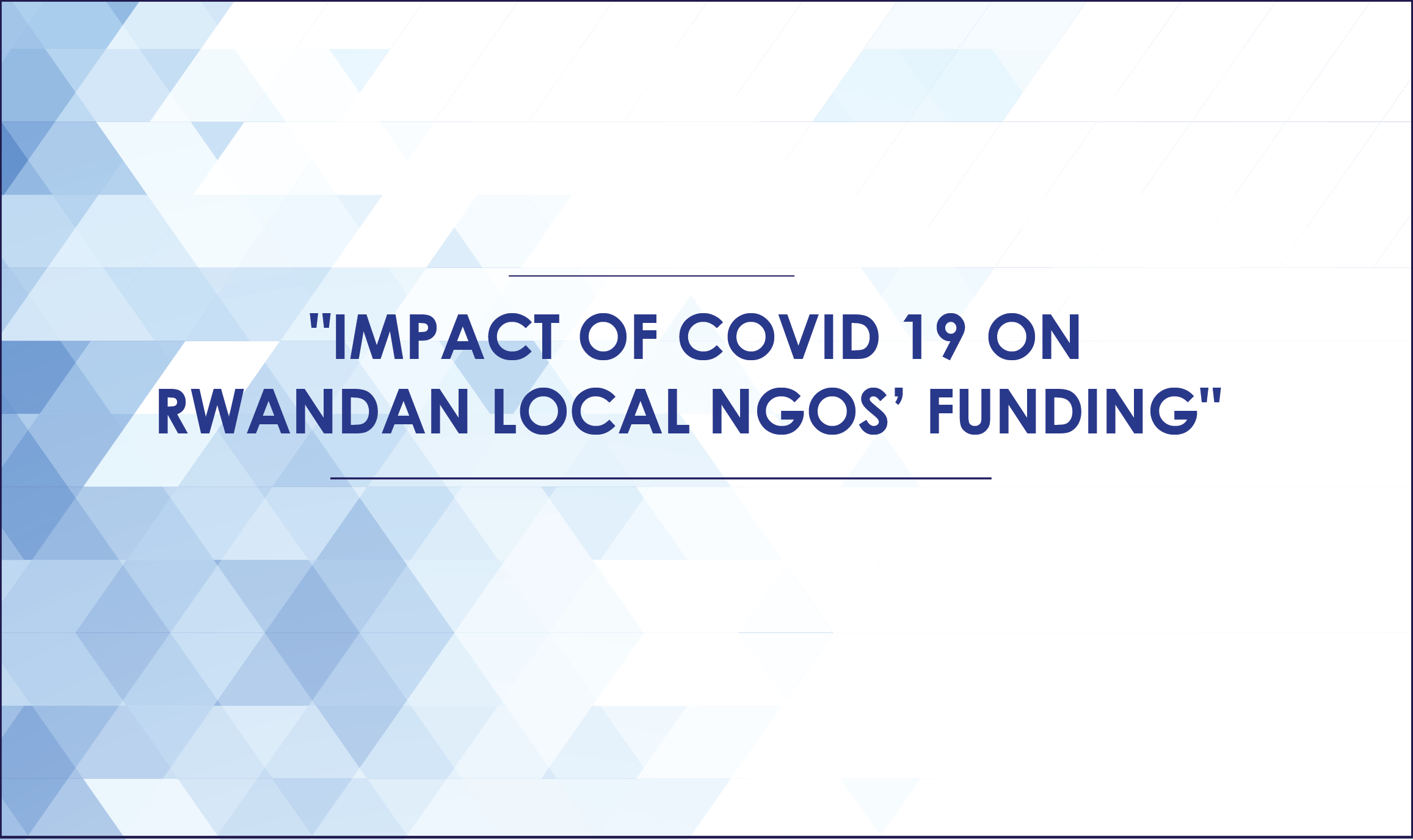Since the first COVID-19 case was reported in China, it was quickly affecting the entire life across the globe. Heath systems, businesses, travel, banking, tourism, education, economies and social life have been affected world-wide. In response to the crisis, Rwanda like many other countries, established response mechanisms to stabilize the situation and deal with the consequences of COVID-19, including fiscal impulse, defer certain payments, liquidity assistance, direct transfers, cut of taxes and social security contributions[1].
In addition, the response strategies include the funding restructuring by the funding community to meet emergency needs across the world. Donors have now prioritized the direct investment into governments’ budgets to cover budget deficits caused by the crisis. This will potentially reduce the funding share given to the countries through local NGOs and community based organizations, which in turn will undermine their capacities to implement development programs and projects.
Furthermore, NGOs have closed offices and are managing tight project based, fixed and restricted budgets, however they are still incurring the fixed costs such as salaries, rent, pension’s contribution, insurance, loans payment etc. This poses a serious problem in programming and operations of local NGOs during and after the crisis.
While developed and developing countries around the world struggle to cope with the shocking rapidity and scale of COVID-19’s spread[2], many international donors’ organizations such as UN, World Bank, USAID, DIFD are much concerned to support countries and redirect funding to support their health systems and emergency funds across countries to deal with COVID-19 pandemic. For example, the UN is calling for $2 billion in new funds to tackle coronavirus in countries with critical humanitarian needs.
This donation restructuring has affected and will continue to affect the capacities of local NGOs that heavily depend on funds from donors. According to the study conducted by Never Again Rwanda (2019), CSOs in Rwanda including local NGOs, is largely donor dependent and have no other relevant sources of funding for their interventions. Despite the existence of a donor community, the number of CSOs in need of funding and the quality of proposals that is required do not guarantee adequate and sustainable funding to all CSOs.
In addition, article 4 of Law No. 04/2012 of 17/02/2012 allows NGOs to “conduct commercial activities only when it is authorized to do so and the profit from such activities is meant to be used in activities related to its objectives”. However, the majority of CSOs have not taken advantage of this opportunity to contribute to the sustainability (Never Again Rwanda, 2019).
As the world is dealing with the crisis and economic recessions resulting from the pandemic, the funding from these donor communities to local NGOs in Rwanda is likely to decline. The priority of this International donor community has shifted to meet needs expressed by government of Rwanda to deal with health emergencies, financing budget deficit and support people mostly affected by the lockdown to meet their basic needs such as food.
This concentration of funding in Health sector is likely to pose serious problem to local NGOs operating in other fields. For example, the U.S. government, through the United States Agency for International Development (USAID), has recently granted more than (US $1,000,000 to government of Rwanda to increase its ability to respond to the on-going COVID-19 pandemic. The focus will be on infection control, disease prevention, detection, diagnosis, treatment, and public information, according to tweet of the US Ambassador in Rwanda
While senior managers of local NGOs still keep their eyes open on new funding opportunities, the current trend is not promising. As the world further shuts down in the wake of the coronavirus pandemic, countries around the world are stepping up efforts to tackle the new coronavirus that has killed thousands. Seeing this emergency, the international organizations and Foundations have released funding calls for health NGOs, researchers and individuals to help control this pandemic disease[3]. While the funding from UN to deal with COVID-19 will be channelled to national and local NGOs to implement humanitarian operations, those not operating in health sector will miss out on the funding opportunities. This lack of new funding opportunities will affect National and local NGOs to meet their mission and achievement of impact in the communities they are serving.
This is in the wake of the fact that local NGOs’ annual budgets are heavily dependent on external funding either from governments and international donor communities, or a small portion from internal fundraising, through its members, sustainability funds or private businesses owned by the NGOs.
NGOs that own private business as a means of self-financing are facing similar challenges, since the lockdown has affected the revenues from these businesses. The decline or lack of internal funds is likely to affect the capacity of NGOs to meet their fixed and variable costs such as salaries, rent, maintenance fees, etc.
As part of mitigation strategies, Rwandan local NGOs have to diversify funding from multiple donors to avoid one donor dependency. Local NGOs ought to continue seeking additional funding opportunities not only from traditional donor communities but explore new and emerging donor community such as Private Corporation companies.
Finally, Rwandan NGOs should forecast ahead of time the financial implications by creating a plan for managing the unavoidable fixed costs and managing cash flow. Local NGOs should hold discussions with their donors on how to build their capacities in coming up with self-financing approach by initiating income generating activities to raise funds for the operations. This will serve NGOs to be resilient to the external donor funding chock.
By Celestin Nsengiyumva
Expert in M&E and program management
[1] Julia Anderson, Enrico Bergamini, Sybrand Brekelmans, Aliénor Cameron, Zsolt Darvas, Marta Domínguez Jíménez. The fiscal response to the economic fallout from the coronavirus 1 April 2020 https://www.bruegel.org/publications/datasets/covid-national-dataset/
[3] https://www2.fundsforngos.org/listing/grant-opportunities-to-tackle-the-coronavirus-outbreak/


